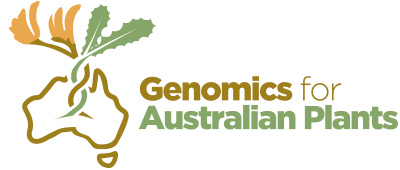Activity
- Reference genomes – Link here
- Phylogenomics – Link here
- Conservation genomics – Link here
- Training – Link here
Project Background
- Plants are the backbone of all life on Earth and a key resource for human well-being. Plants not only provide oxygen, food, medicine, and habitat, but regulate the water, carbon and nitrogen cycles, capturing and storing carbon released from the burning of fossil fuels.
- Climate change has important implications for many aspects of life. Changes in temperature, rainfall etc can affect plant diversity as species that are unable to adapt are particularly vulnerable.
- Australia’s unique native plant life is under threat, with 75% of our native vegetation impacted due to varying degrees of disturbance or neglect since the first Europeans came to Australia.
- Genomic approaches offer the possibility of unlocking the enormous information in nuclear genomes for plant evolutionary and conservation studies to significantly improve conservation management decisions.
Project overview and aims
- The Genomics for Australian Plants Initiative was catalysed by Bioplatforms Australia in partnership with researchers from the Australian State and National Herbaria and Botanic Gardens.
- This nationally-inclusive and collaborative initiative is supported by funding from Bioplatforms Australia through the Australian Government National Collaborative Research Infrastructure Strategy (NCRIS), the Ian Potter Foundation, Royal Botanic Gardens Victoria, the Royal Botanic Gardens and Domain Trust, CSIRO, Centre for Australian National Biodiversity Research and the Department of Biodiversity, Conservation and Attractions, Western Australia.
- The central resource for this initiative will be derived from herbaria and botanic gardens (living collections) around the country. The addition of genome sequencing data will add significant value to the collections and contribute to the development of new methods and capabilities.
- Bioplatforms investment in genomics data generation is augmented with in-kind contributions from the wider plant community in sourcing plant material, preparation of material for genomic sequencing, development of bioinformatics pipelines for data analysis and data sharing (e.g. contributing to and benefiting from collaborations with other international initiatives).
- The three main aims in the initiatives are in the generation, analysis and dissemination of genomics data in the following areas:
- Reference genomes
- Phylogenomics
- Conservation genomics
Project outcomes to date (May 2018)
- The three pilot genomes from the initiative are: Acacia pycnantha (golden wattle), Areocleome oxalidea (spider flower) and Telopea speciosissima (waratah).
- Various expert working groups have been set up and will continue to evolve to address the challenges in the projects including defining the project scope, sequencing approaches, bioinformatics pipelines etc.
- Data derived from this initiative will be publicly accessible (after a 12-month mediated access period) and will contribute significantly to the plant genomic resources and bioinformatics pipelines both in Australia and globally.
- Many of the activities are closely aligned with and help deliver on strategic actions under the Decadal Plan for Taxonomy and Systematics in Australia and New Zealand (2018-2027: https://www.science.org.au/support/analysis/decadal-plans-science/discovering-biodiversity-decadal-plan-taxonomy), which is a roadmap for investment to drive a step change in productivity and capability in the discipline.
For more recent updates, please click here.
